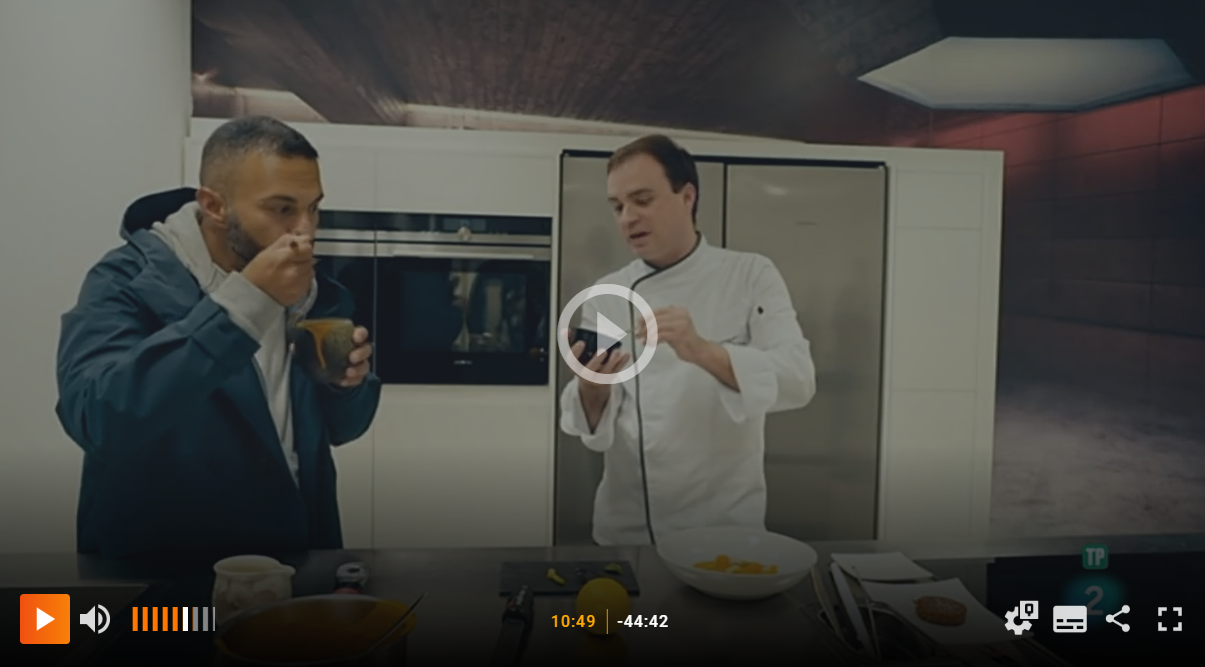Chef José Andrés has been announced as the winner of the Basque Culinary World Prize 2020 for his World Central Kitchen (WCK) project. Andrés was chosen for providing a global and collaborative response from gastronomy to the most pressing challenge of our time: the COVID-19 pandemic.
The BCWP jury said José Andrés symbolized the efforts made by chefs around the world to the challenges posed by the crisis and embodied the collaborative action needed during such testing times. The strength, speed and efficiency demonstrated by Andrés in the face of the COVID-19 crisis has also inspired many other professionals to launch various programmes aimed at reviving the catering sector. José Andrés has been cited as an inspiration by many of those who decided to take action in their local communities and has become a global symbol of the efforts made by chefs during the crisis.
In that sense, Andrés’s work symbolizes the efforts made by chefs around the world and embodies the actions needed during these trying times such as: facilitating access to food in regions facing shortages; managing solidarity kitchens in challenging contexts; re-establishing supply chains for small producers; providing direct support to restaurant staff as the industry’s workforce continues to struggle with the consequences of closed bars and restaurants; and simply for setting an example of cooperation and responsibility.
The strength, speed and efficiency demonstrated by José Andrés in the face of COVID-19 has become a global symbol of the efforts made by chefs during the crisis. For this reason, in addition to José Andrés, the BCWP jury also recognizes the work of 10 chefs, granting special recognition to:
Mariana Aleixo, for her work in the favelas of Rio de Janeiro with Maré de Sabores;
Elijah Amoo Addo, for projects such as Food for All Africa and Chefs on Wheels in Ghana;
Greg Baxtrom, for leading welfare drives in response to the pandemic in New York;
Simon Boyle, for providing relief to disadvantaged groups in London with Brigade;
Tracy Chang, for Off Their Plate and Project Restore Us in Cambridge, Massachusetts;
David Hertz of Gastromotiva for leading food banks and facilitating other initiatives in Brazil and Mexico; Ed Lee, for inspiring community work on behalf of restaurant employees across the United States; Juan Llorca, of Spain, for assisting parents during lockdown by providing healthy, simple recipes for children via YouTube;
Nicole Pisani, of Chefs in Schools in the UK, for providing food to disadvantaged young people while school canteens were closed.
José Andrés – a Spanish-American chef and owner of a chain of restaurants in the United States – established WCK 10 years ago, assembling chefs from around the world and mobilising them to provide a global and cooperative response to a variety of emergency situations.
He has already used his influence to support political and humanitarian causes such as helping to create food resiliency in the face of disasters in Haiti and Puerto Rico, and has spent years promoting immigration reforms and job improvements in the catering sector. Throughout, he has been aware that the kitchen can be an engine for social change.
During the challenges created by the pandemic, WCK has played an important role. When the spread of coronavirus began to escalate in March, José Andrés took action, both in cities across the US and in Spain. With the health crisis at its worst in Spain, WCK was running around 150 kitchens in 10 cities with the support of local chefs, food banks and the Red Cross. The organisation showed that during the pandemic it had evolved into a global collaborative initiative between chefs across the world.
As an owner of a large chain of restaurants in the United States, this Asturian chef points out that "only those who work in the restaurant sector can help revive the economy while at the same time rebuild communities." Founded ten years ago, WCK has intervened in many countries and mobilized thousands of volunteers and cooks from around the world. In addition, the chef has spent years promoting immigration reforms and workplace improvements for the restaurant sector, aware that the kitchen can be an engine of social change.
BCWP intends, in its 5th edition, to rise to the challenges that have been marked by the pandemic generated by COVID-19. Professionals from all corners of the planet have turned to finding creative solutions from gastronomy. For this reason, this year the BCWP has focused on chefs who have offered inspiring, courageous and impactful responses. Professionals in the sector who have helped to cope with a global and collective crisis. Therefore, a winner has been selected that symbolizes the response of the sector and 10 special mentions that provide valuable insight and testimony about the reaction of the sector.
The Basque Culinary World Prize is a unique €100,000 award for chefs around the world whose work has transformed society through gastronomy, and is awarded by the Basque Culinary Centre, a world leading gastronomic institution, and the Basque Government.
The winner is chosen by a jury made up of the world's most influential chefs. Chaired by Joan Roca (El Cellar de Can Roca), the jury also included renowned names within gastronomy such as Ferrán Adrià (El Bulli Foundation), Mauro Colagreco (Mirazur), Gastón Acurio (Acurio Restaurants), Manu Buffara (Manu), Dan Barber (Blue Hill Farm), Eneko Atxa (Azurmendi), Dominique Crenn (Atelier Crenn), Andoni Luis Aduriz (Mugaritz), Enrique Olvera (Pujol), Trine Hahnemann (Hahnemanns Køkken) and Yoshihiro Narisawa (Les Créations de Narisawa).
Joan Roca, Chair of the Prize Jury, said:
"In view of this year’s exceptional circumstances, our responsibility had to rise to the current challenges. After an intense process of reflection, we wanted to focus the award on the challenge facing the entire planet due to COVID-19– a challenge that chef Jose Andrés has faced with courage, bravery and a titanic effort. His admirable dedication to work, his ability to deal with humanitarian crises and his present and evident leadership have served as a source of inspiration for many people who have joined its World Central Kitchen initiative around the world. It’s a project that has also made visible the work of volunteers who have turned gastronomy into a strong social tool "
Joxe Mari Aizega, Director General of the Basque Culinary Centre, said:
“A year like 2020 has put us to the test and so the Basque Culinary World Prize highlights how the sector had an important part to play in the midst of an unprecedented crisis. Chefs understood that they could harness their knowledge, leadership, entrepreneurship and creativity to help society in different ways.
“The pandemic has highlighted the contributions of our sector in its entirety, so it was not enough to announce just one winner, but to recognize, with the 10 special recognitions, the performance of exemplary professionals who have used their knowledge, creativity and will to influence in society, making the best use of the transformative capacity of gastronomy.”
Bittor Oroz, Deputy Minister of the Department of Economic Development and Infrastructure of the Basque Government, said:
“In this complex context generated by COVID-19 where the world is in the midst of an unprecedented crisis, we have opted to maintain the Basque Culinary World Prize, which is already in its 5th edition. This award reaffirms its role of identifying and promoting transformative activities that build a more sustainable world. More than ever, this year is a period where gastronomy has demonstrated its relevancy as– despite its complexities– the industry has a pragmatic attitude for improvement. It’s a time to highlight professionalism, innovative and avant-garde character, and the supportive attitude of men and women in gastronomy. The prize– a unique and global award– is part of the comprehensive Euskadi Basque Country strategy and aims at bringing the valuesshared by Basque society to the global stage including our work ethic, commitment, tenacity, innovative and competitive character, and equal opportunities for men and women.”
SPECIAL RECOGNITIONS BIOGRAPHIES:
ELIJAH AMOO ADDO Food For All Afrika, Ghana
Elijah is a chef, social entrepreneur and creator of Food for All Africa in 2014, an organization dedicated mainly to feeding vulnerable children in sub-Saharan Africa and recovering surplus food provided by supermarkets and restaurants. Through projects like Chefs on Wheels, Elijah has been a vital community leader during the pandemic by distributing solidarity meals, which have been more necessary than ever since many social eateries on which hundreds of people depend are temporarily closed. The hospitality sector in Ghana, like in many other countries, was seriously affected by the pandemic. Since 40% of the workforce depends on the sector, the closure of hotels, bars and restaurants in the country meant that many struggled during the pandemic. Therefore, Elijah’s volunteering network has been critical in caring for children and young people in catering during these challenging times.
MARIANA ALEIXO Maré de Sabores, Brazil
Aleixo is a professional chef who, since 2010, has managed the Maré de Sabores programme and integrated it into the community movement known as Redes da Maré. This is an organisation that aims to provide support for the rights of those living in the 16 favelas that make up the community of Maré in Rio de Janeiro, which has a total of 140,000 inhabitants. The programme provides cooking workshops and gastronomic events for the community. The programme also runs a buffet which employs women from the parent project and offers healthy food to the community at an affordable price. During the pandemic, Maré de Sabores has had an important role in the favelas, serving as a food bank and providing solidarity meals. Alexio led and coordinated all work on food security, food management, preparation and distribution of meals. Throughout the crisis, the programme has also been at the forefront of a campaign for awareness, education and social work.
GREG BAXTROM Olmsted, USA
From his Brooklyn location, Greg led the New York Hospitality Coalition, a trade union coalition to exchange information and work together to put pressure on the authorities in New York to respond to the pandemic. In partnership with Maker's Mark and the Ed Lee Initiative, he transformed his Olmsted restaurant into a food bank and community support centre. Also, in the wake of the Black Lives Matter protests, Baxtrom opened his Maison Yaki restaurant space to black chefs, bartenders and entrepreneurs for the foreseeable future. Baxtrom wanted to offer the space to bring awareness to the Black Lives Matter movement and those using the Maison Yaki space can serve food from the restaurant’s front window.
SIMON BOYLE Beyond Food, UK
Simon Boyle is a chef and entrepreneur who has shown that gastronomy has much to contribute in the context of social causes. Boyle founded Beyond Food in 2011 which focuses on helping people escape poverty through culinary training and rebuilding their lives through food. The chef at social enterprise restaurant, Brigade (London) has focused his efforts on securing resources and food for vulnerable groups such as those living in shelters and homeless people in particular. The programmes focus is on breaking the cycle of homelessness, unemployment and poverty by equipping people with the basics of cooking. By providing essential culinary skills and introducing people to the benefits of fresh, healthy food, Beyond Food is helping the most vulnerable become more independent and give them a sense of belonging. Also, in collaboration with health experts as well as his restaurant team and students at the training centre, Simon has started a 24/7 emergency hotline where people can call in need of psychological help.
TRACY CHANG Off Their Plate, USA
Tracy is a chef and owner of the restaurant PAGU, located in Cambridge, USA where the majority of her employees are from immigrant backgrounds. During the coronavirus pandemic, she co-founded Off Their Plate, an initiative that aims to feed health and essential workers whilst trying to restore jobs and livelihoods of restaurant workers affected by the pandemic. Alongside Ken Oringer (chef at Little Donkey, Toro Uni and Coppa) and Natalie Guo (Harvard Medical school student), she mobilised resources around a social cause that has served to provide resources for restaurants whilst producing food mainly for hospitals. The initiative is designed to help vulnerable communities such as immigrant families that are struggling to get access to food. By partnering with restaurants, the initiative ensures that families receive nutritious food safely, served efficiently. Now Project Restore Us is working on refining and scaling the model whilst searching for multiple sources of funding. The project is sponsored by CommonWealth Kitchen.
GHETTO GASTRO, USA
Jon Gray, Lester Walker, Malcolm Livingston II, and Pierre Serrao are four chefs who set out on a mission to diversify the gastronomy scene and challenge stereotypes with their cooking collective Ghetto Gastro in New York. Combining art, music and social awareness, Ghetto Gastro has already offered a unique space and voice for a diverse community of young people for seven years, going beyond the catering industry by serving as a creative space that promotes inclusivity. With the ongoing pandemic and Black Lives Matter movement, the message and work of Ghetto Gastro resonates more than ever with recent events in the USA.
DAVID HERTZ Gastromotiva / Social Gastronomy Movement, Brazil
David created Gastromotiva in 2006 to help foster social inclusion in Brazil through gastronomy. The initiative offers culinary training to young people and unites many different sectors of society around the transformative power of food. Fourteen years later, and in partnership with more than 32 local organisations, Gastromotiva is now a global success with operations in Brazil, Mexico, South Africa and El Salvador. The initiative covers a number of projects such as “Gastromotiva Refettorio”, a social dining room opened in collaboration with Food For Soul in Rio de Janeiro Janeiro – which provided food for homeless people from leftovers from the Rio Olympic Village – to the launch of the Social Gastronomy Movement in 2017, a global network that brings together chefs to promote causes such as sustainable development, healthy eating and social inclusion through the power of food.
ED LEE Lee Initiative, USA
Ed is passionate about creating a fairer, more tolerant and diverse labour force and promotes issues surrounding immigration, social justice and inclusion from the kitchen. Even before the coronavirus crisis and the Black Lives Matter protests in the United States, the LEE initiative has been at the forefront of social causes. Ed’s NGO was created to promote training, mentoring and investment programmes in young talent. Initiatives such as the Restaurant Regrow Program offers immediate relief for culinary communities across Kentucky such as financial support and assistance to restaurants and food service workers that have been affected by then Covid-19 crisis. Whilst the Restaurant Workers Relief Programme has distributed 140,000 meals to unemployed workers in the catering industry with the help of local leaders in 19 cities in the United States. The creation of community kitchens helped to alleviate some of the impacts of the crisis in communities and the launch of the Reboot Relief Reboot Program helped to reactivate the base of the production chain by engaging with small producers and reconnecting broken production chains.
JUAN LLORCA Por una Escuela bien Nutrida, Spain
Juan shifted his focus from haute cuisine to an unusual challenge for a chef: transforming the food of a school canteen. Showcasing passion, tenacity and hard work, Juan managed to transform schools into a place where students enjoy and form connections to healthy food as well as study. His initiative “Por una Escuela bien Nutrida” has started a discussion about the food offered in Spanish schools, where one third of the students receive their main meal of the day. With the closure of schools during the pandemic, a lot of parents also needed support to come up with creative meal plans for their children during confinement. Juan provided food content such as healthy and easy recipe ideas via YouTube to help those who needed solutions throughout the pandemic.
NICOLE PISANI Chefs in Schools, UK
School children are one of the many groups affected by the crisis and many, especially disadvantaged children, depend largely on the food they receive in school canteens. In the face of the pandemic, children have been at risk of food insecurity or a lack of access to balanced and healthy eating. Nicole was head chef at NOPI restaurant in London, before moving on to school meals and co-founding "Chefs in Schools". Until the pandemic hit, she had focused on changing the perception of school canteens through "intervention" programs in canteens and educational methods supported by cooks across the country. However, the pandemic caused her to focus her efforts on using the resources she had to ensure children could still access and enjoy nutritious food. Her charity is working hand-in-hand with food-sharing and surplus-food charities and initiatives including Olio, The Felix Project and Magic Breakfast, as part of a huge network across London.






